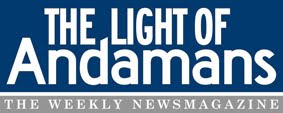THE LIGHT OF ANDAMANS | ISSUE 14 | 30 SEPTEMBER 2011
Jarawa Policy 2004 Well Conceived: SA Awaradi
By Staff Reporter
The members of the expert committee on Jarawas have recorded their observation that the Jarawa Policy of 2004 is well conceived. However, it feels that regular periodic monitoring of its implementation by an independent body consisting of experts and administration is required to be put in place.
Dr Awaradi in a report submitted has also suggested reduction of convoys on Andaman Trunk Road. He has observed that the traffic on ATR is a major location of interaction and source for the items including eatables, rice etc for the Jarawas. He has suggested that the traffic on the ATR in the South Andaman Island Middle Strait
He felt that the absence of traffic in afternoon would facilitate the safe movement of the Jarawas on the road i.e. by avoiding road accidents and could also end the disturbance in the hunting activities.
The report also recorded its observation that rice has found its way into the lives of Jarawas through clandestine barter between Jarawas and non-Jarawas. It says that Jarawas has learnt to trap deer, catch crabs with active behind the scene support in the form of supply of rope traps and other articles. The hunts are exchanged with the non-tribals and the Jarawas take rice, spices, cooking oil etc in return. The Jarawas have learnt to respond intelligently with authorities if encountered.
The report says that rice has become a valued article of food among the Jarawas. If rice becomes a preferred and sought after item by overtaking their traditional indigenous food items, the Jarawas would become not only dependent on others for their food but become victims of exploitations by unscrupulous non-Jarawas. The committee fears that following the inroad of rice, the rice-bear would also appear on the scene and thereby worsening the situation. There are living examples in the ANI wherein the aborigines have adopted rice as food item due to the contacts with the traders and have become dependent on the others. The report says that there is an urgent need to control the inflow of the rice among the Jarawas.
On the hospitalization of Jarawas, the report says that the hospitalized Jarawas are perforce eating the rice because they are away from their natural habitat. Thus, shifting of Jarawas even for minor treatment to the hospitals located away from their inhabited areas leads to consumption of rice. As such, the location of medical sub-centres could be as close to Jarawa areas as possible so that the Jarawa attendants and patients can continue to have access to their normal food under the advice of medical personnel.
Dr Awaradi has suggested that a mechanism has to be established for continuous long term observation and study of the Jarawas so that input is available to enable the government to review the policy measures and activities if required.
ANI Admn had formed an expert committe to assess the actual perceptions, needs and expectations of the Jarawa tribe, covering various groups inhabiting South and Middle Andaman. The 2004 policy on Jarawa tribes is being reviewed looking at the changed scenario, wherein some members of the tribe are coming out of their area and having more contact with the outside world.

No comments:
Post a Comment